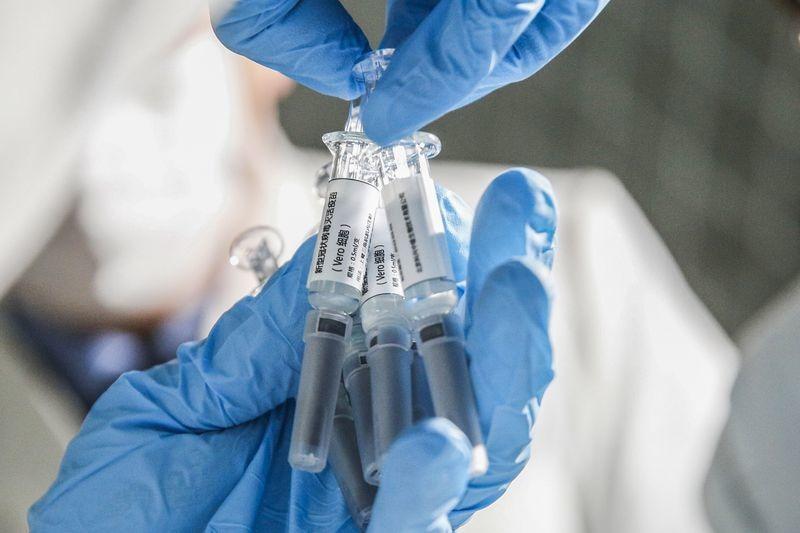 In this March 16, 2020 photo, a staff member displays samples of the COVID-19 inactivated vaccine at Sinovac Biotech Ltd, in Beijing, capital of China. (PHOTO / XINHUA)
In this March 16, 2020 photo, a staff member displays samples of the COVID-19 inactivated vaccine at Sinovac Biotech Ltd, in Beijing, capital of China. (PHOTO / XINHUA)
HONG KONG – Chinese biotech companies, among the leaders in the global push to develop COVID-19 vaccines, are collaborating with vaccine developers in other countries to get to the finish line faster.
Beijing-based Sinovac Biotech Ltd, which has a promising vaccine candidate, is moving forward on a collaboration with Indonesia’s state-owned drug maker PT Bio Farma to test and manufacture its vaccine candidate there. Bio Farma has announced plans to start late-stage trials of Sinovac’s CoronaVac in July.
The plan is for Sinovac to provide the formulation, technology and active pharmaceutical ingredients (API) for Bio Farma to quickly develop, test, manufacture and distribute a vaccine in the world’s fourth most populous country.
READ MORE: COVID-19 vaccine reaches phase-2 trials in China
Sinvac’s CoronaVac has done well in a first pair of clinical trials. Its next step includes setting protocols for a phase III study
CoronaVac has already gone through a first pair of clinical trials and has done well. Its next step includes setting protocols for a phase III study.
In Indonesia, Bio Farma wants to get through the clinical studies quickly and start commercializing the vaccine in the first quarter of 2021. Bio Farma president director Honesti Basyir said in April that its production facility “can handle up to 2 billion dosages,” thus enabling it “to produce the vaccine by ourselves”.
China has already been working with Indonesia to fight COVID-19. In early June, a second batch of medical supplies donated by the Chinese government arrived in the Indonesian capital, Jakarta. This second batch included 100,000 test kits, 70,000 pieces of personal protective equipment, 70,000 protective masks and 1.3 million surgical masks donated by the central government, local governments and enterprises.
Harmensyah, the secretary-general of Indonesia’s National Board for Disaster Management, said at the time that he appreciated the donation and that Indonesia still faces an uphill battle against the pandemic.
Indonesia has made its desire for a vaccine clear. Coordinating Minister for Economic Affairs Airlangga Hartarto said the country needs to secure a minimum 340 million ampoules of a COVID-19 vaccine to accommodate at least 170 million people, about two-thirds of the country's total population, according to World Bank estimates.
Bio Farma is also working on a vaccine it is hoping to create from scratch with the Jakarta-based Eijkman Institute for Molecular Biology, but a seed vaccine from this collaboration is not likely to be ready for distribution until at least the end of 2021.
ALSO READ: China to make COVID-19 vaccine global public good, says official
Sinovac is in talks to hold trials for its vaccine in Canada, and in Brazil, the Instituto Butantan, a biologic research center, is setting the stage to carry out phase III trials.
These multi-pronged efforts could be an opportunity for Sinovac and other Chinese companies to learn about new markets.
“As China has put in place a quality consistency evaluation system, the quality of Chinese drugs, medical devices and test kits has improved, which has helped made-in-China products win market share and get more orders,” said Alice Zhang, a solutions consultant at life sciences firm Clarivate Analytics in Beijing.
Another company with a COVID-19 vaccine in the works is Beijing-based Yisheng Biopharma Co Ltd.
“If COVID-19 is going to be around for the next few years, definitely it’s impossible for a single company or just a handful of them to handle this kind of demand at the global level. I estimate that, even in China, we need at least 10 vaccine producers for such significant scale production capacity,” Yisheng CEO David Shao told China Daily. “It definitely requires a joint effort by many players from different countries.”
Yisheng is also considering expanding overseas to test and manufacture its vaccine. A manufacturing plant in Singapore is in the early stages of design.
“We’re actively looking for partners from different locations such as the US, Europe or other countries. We think this is going to be multi-country effort. We want to work together with other partners in not only clinical development but also manufacturing and commercialization,” said Shao.
“We’re absolutely willing to share our know-how with other countries.”
Shao said Chinese companies’ collaboration with other players and conducting of clinical trials outside China “paves the way for clinical achievements that can eventually benefit the global population”.


